-
12-04-2023
A cronicidade e o seu impacto na saúde do trabalhador: uma chamada para ações concretas
Revista Brasileira de Enfermagem. 2023;76:e76suppl301
Abstract
A cronicidade e o seu impacto na saúde do trabalhador: uma chamada para ações concretas
Revista Brasileira de Enfermagem. 2023;76:e76suppl301
DOI 10.1590/0034-7167.202376suppl301pt
Views0A relação entre cronicidade e trabalho tem sido uma preocupação crescente na sociedade contemporânea. À medida que o número de doenças crônicas aumenta em todo o mundo, é fundamental compreender como essas condições impactam a saúde dos trabalhadores(). Neste editorial, exploraremos os impactos da cronicidade na saúde do trabalhador, destacando dados da Carga Global de […]See more -
12-04-2023
Chronicity and its impact on workers’ health: a call for concrete actions
Revista Brasileira de Enfermagem. 2023;76:e76suppl301
Abstract
Chronicity and its impact on workers’ health: a call for concrete actions
Revista Brasileira de Enfermagem. 2023;76:e76suppl301
DOI 10.1590/0034-7167.202376suppl301
Views0The relationship between chronicity and work has been a growing concern in contemporary society. As the number of chronic illnesses increases around the world, it is critical to understand how these conditions impact workers’ health(). In this editorial, we will explore the impacts of chronicity on workers’ health, highlighting data from the Global Burden of […]See more -
12-04-2023
General Law on Personal Data Protection and applicability to Nursing
Revista Brasileira de Enfermagem. 2023;76:e20230126
Abstract
General Law on Personal Data Protection and applicability to Nursing
Revista Brasileira de Enfermagem. 2023;76:e20230126
DOI 10.1590/0034-7167-2023-0126
Views0See moreABSTRACT
Objectives:
to reflect on the impacts of the General Personal Data Protection Law on Nursing practice.
Methods:
reflection article, through the intentional collection of materials relating to the topic.
Results:
legislation regulates confidentiality, processing and data sharing, requiring institutional protection measures. The nursing team is responsible for acting preventively, both in care and in the management role, in order to avoid the misuse of the patient’s personal data. The law allows academic research to be carried out as long as the purpose is clear, data collection occurs with an explicit purpose and data is anonymized.
Final Considerations:
although the General Personal Data Protection Law requires greater care in relation to data processing, it is established on precepts of good faith and respect for the rights of the individual, concepts aligned with the nursing code of ethics.

-
REVIEW12-04-2023
Supervision of professional nursing practice in Brazil: a scoping review
Revista Brasileira de Enfermagem. 2023;76:e20230077
Abstract
REVIEWSupervision of professional nursing practice in Brazil: a scoping review
Revista Brasileira de Enfermagem. 2023;76:e20230077
DOI 10.1590/0034-7167-2023-0077
Views0See moreABSTRACT
Objectives:
to map studies that analyze the audit process of nursing councils.
Methods:
this is a scoping review, anchored in the JBI framework, with the guiding question: what is the evidence of the audit process of legal practice of nursing by class councils (COFEN/COREN system)? The searches were carried out in October and November 2022 without limitation of language and year.
Results:
of the 9 selected studies, all are Brazilian and published from 2014 onwards. Among the topics addressed are the role, challenges, costs and difficulties in nurse auditors’ daily work process, in addition to the contribution of the audit sector in Brazil.
Conclusions:
the studies gathered discuss aspects related to costs, challenges and difficulties, but there is no focus on corrective, disciplinary and educational activities as well as little is said about the audit process, its reporting, referral and outcomes.

-
ORIGINAL ARTICLE12-04-2023
Overview of nursing ethics teaching in Brazilian public higher education institutions
Revista Brasileira de Enfermagem. 2023;76:e20220808
Abstract
ORIGINAL ARTICLEOverview of nursing ethics teaching in Brazilian public higher education institutions
Revista Brasileira de Enfermagem. 2023;76:e20220808
DOI 10.1590/0034-7167-2022-0808
Views0See moreABSTRACT
Objectives:
to outline the teaching of ethics in undergraduate Nursing programs in Brazilian public higher education institutions.
Methods:
descriptive and exploratory study, carried out through the documentary analysis of pedagogical projects of undergraduate Nursing programs in Brazil.
Results:
153 active undergraduate Nursing programs were found, of which 106 provide the pedagogical project. In addition to deontological teaching, the teaching of ethics was identified in a transversal way associated with themes such as Social Context, Hospital and Community Care, Pharmacology, Systematization of Nursing Care, Surgical Nursing, Epidemiology, Palliative Care, Management in Nursing, Diversity, Women’s, Children’s, Adolescent’s, Adult’s and Older People’s Health, and Mental Health.
Final Considerations:
the challenge in teaching nursing ethics is its integration with each action of caring, teaching and managing.

-
12-04-2023
La ética de la atención de enfermería a las personas transgénero
Revista Brasileira de Enfermagem. 2023;76:e20220797
Abstract
La ética de la atención de enfermería a las personas transgénero
Revista Brasileira de Enfermagem. 2023;76:e20220797
DOI 10.1590/0034-7167-2022-0797es
Views0See moreRESUMEN
Objetivos:
debatir sobre aspectos éticos en la atención de enfermería a personas transgénero.
Métodos:
estudio reflexivo fundamentado sobre los dilemas que se plantean en los cuidados de enfermería a personas transgénero. El relato se ha estructurado en torno a los cuatro principios bioéticos.
Resultados:
la atención sanitaria a las personas trans es compleja, transversal a muchos dispositivos y especialidades y longitudinal en el tiempo por lo que precisa de la actuación coordinada. Existe un marco ético en el que se encuadran los cuidados de enfermería que se precisan en la atención a este colectivo.
Consideraciones Finales:
la enfermera como agente de salud puede asumir diversas líneas generales en la atención a pacientes transgénero. Para ello, se debe brindar formación adicional no solo a los profesionales, también a los estudiantes de enfermería y de las demás ciencias de la salud.
-
12-04-2023
Ethical dilemmas at the end of life: a reflection from the Philosophical Perspective of Luigina Mortari
Revista Brasileira de Enfermagem. 2023;76:e20220759
Abstract
Ethical dilemmas at the end of life: a reflection from the Philosophical Perspective of Luigina Mortari
Revista Brasileira de Enfermagem. 2023;76:e20220759
DOI 10.1590/0034-7167-2022-0759
Views0See moreABSTRACT
Objectives:
to reflect on the ethical dilemmas involved in the care of patients at the end of their lives.
Methods:
this is a theoretical-reflective study based on the ethics of care proposed by Luigina Mortari.
Results:
discussing care involves addressing the ways of being inherent to human existence and understanding the unique characteristics of this condition. Ethical care constitutes an action driven by interest in the other and by the perception of their need. Ethical dilemmas are a part of end-of-life care, making it essential to maintain respectful assistance that considers the patient’s autonomy, using strategies for expressing their wishes, and ensuring continuous clear and empathetic communication among all those involved in providing care.
Final Considerations:
issues related to being, stemming from one’s reality of dependency and vulnerability, contribute to the emergence of ethical dilemmas present in care actions.
-
01-01-2016
Determining impacts and factors in ventilator-associated pneumonia bundle
Revista Brasileira de Enfermagem. 2016;69(6):1108-1114
Abstract
Determining impacts and factors in ventilator-associated pneumonia bundle
Revista Brasileira de Enfermagem. 2016;69(6):1108-1114
DOI 10.1590/0034-7167-2016-0253
Views0See moreABSTRACT
Objective:
Assessing the determining impacts and factors in ventilator-associated pneumonia (VAP) bundle.
Method:
descriptive retrospective longitudinal study, with quantitative approach, held at a public teaching hospital. Collection held between May 2014 and April 2015. Patients of the ICU with VAP participated in the research. For organizing data, the Microsoft Excel 2010 program was used. A critical analysis between the data collected and infection rates was performed. The survey was approved under no. 566,136.
Results:
an increase in the incidence of VAP after implementing the bundle was observed; the prevalent pathogens were gram-negative bacteria. Deaths were equal to or greater than 50%. Changes of professionals and lack of supplies were determining factors.
Conclusion:
in this context, the need for permanent qualification of the team is emphasized, with the purpose of promoting the adherence to the protocol and preventing VAP.

-
01-01-2016
Multidisciplinary team of intensive therapy: humanization and fragmentation of the work process
Revista Brasileira de Enfermagem. 2016;69(6):1099-1107
Abstract
Multidisciplinary team of intensive therapy: humanization and fragmentation of the work process
Revista Brasileira de Enfermagem. 2016;69(6):1099-1107
DOI 10.1590/0034-7167-2016-0221
Views0See moreABSTRACT
Objective:
to understand the meaning of humanized care in intensive care units considering the experience of the multidisciplinary team.
Method:
descriptive and exploratory qualitative research. For this purpose, we conducted semi-structured interviews with 24 professionals of the heath-care team, and, after transcription, we organized the qualitative data according to content analysis.
Results:
from two main categories, we were able to understand that humanized care is characterized in the actions of health-care: effective communication, team work, empathy, singularity, and integrality; and mischaracterized in the management processes, specifically in the fragmentation of the work process and health-care, in the precarious work conditions, and in differing conceptual aspects of the political proposal of humanization.
Conclusion:
care activities in intensive therapy are guided by the humanization of care and corroborate the hospital management as a challenge to be overcome to boost advances in the operationalization of this Brazilian policy.
-
01-01-2016
Humanized Care: insertion of obstetric nurses in a teaching hospital
Revista Brasileira de Enfermagem. 2016;69(6):1091-1098
Abstract
Humanized Care: insertion of obstetric nurses in a teaching hospital
Revista Brasileira de Enfermagem. 2016;69(6):1091-1098
DOI 10.1590/0034-7167-2016-0295
Views0See moreABSTRACT
Objective:
to evaluate the care provided at an Antepartum, Intrapartum, Postpartum (AIP) unit at a teaching hospital following the inclusion of obstetric nurses.
Method:
transversal study, performed at a AIP unit at a teaching hospital in the capital of the Brazilian state of Mato Grosso. The sample comprised data regarding the 701 childbirths that took place between 2014 and 2016. The data were organized using Excel and analyzed using version 7 of Epi Info software.
Results:
the results suggest that including obstetric nurses contributed towards qualifying the care provided during labor and childbirth, followed by a reduction in the number of interventions, such as episiotomy caesareans sections, and resulting in encouragement to employ practices that do not interfere in the physiology of the parturition process, which in turn generate good perinatal results.
Conclusion:
inserting these nurses collaborated towards humanizing obstetric and neonatal care.
-
01-01-2016
Normative grounds of health care practice in Brazilian nursing
Revista Brasileira de Enfermagem. 2016;69(6):1082-1090
Abstract
Normative grounds of health care practice in Brazilian nursing
Revista Brasileira de Enfermagem. 2016;69(6):1082-1090
DOI 10.1590/0034-7167-2016-0228
Views0See moreABSTRACT
Objective:
to understand the normative grounds of health care practice in Brazilian nursing.
Method:
qualitative study with the use of document research, carried out based on resolutions of the Federal Nursing Council. From a total of 263 resolutions, in the period from 1975 to 2015, 38 which were in accordance with the objective of the study were selected.
Results:
three analytical categories were systematized: Normative grounds of health care practice by the nursing team, under coordination/supervision of the nurse; Normative grounds of the care performed privately by the nurse; and Management and administrative aspects which affect and permeate the practice of health care in nursing.
Conclusion:
the set of normative grounds of health care practice by the nursing team leads to the reflection on the possible overlapping of attributions between professional levels and requires expansion to the other fields of nursing which are coherent with the health care network model.

-
01-01-2016
Palliative care and the intensive care nurses: feelings that endure
Revista Brasileira de Enfermagem. 2016;69(6):1074-1081
Abstract
Palliative care and the intensive care nurses: feelings that endure
Revista Brasileira de Enfermagem. 2016;69(6):1074-1081
DOI 10.1590/0034-7167-2016-0267
Views0See moreABSTRACT
Objective:
to know the feelings of nurses regarding palliative care in adult intensive care units.
Method:
qualitative study, which adopted the theoretical framework of Social Representations, carried out with 30 nurses of the state of Santa Catarina included by Snowball sampling. Data were collected through semi-structured interviews conducted from April to August 2015, organized and analyzed through the Collective Subject Discourse.
Results:
the results showed how central ideas are related to feelings of comfort, frustration, insecurity and anguish, in addition to the feeling that the professional training and performance are focused on the cure.
Conclusion:
the social representations of nurses regarding the feelings related to palliative care are represented mainly by negative feelings, probably as consequence of the context in which care is provided.
-
01-01-2016
Multi-professional intervention in adults with arterial hypertension: a randomized clinical trial
Revista Brasileira de Enfermagem. 2016;69(6):1067-1073
Abstract
Multi-professional intervention in adults with arterial hypertension: a randomized clinical trial
Revista Brasileira de Enfermagem. 2016;69(6):1067-1073
DOI 10.1590/0034-7167-2016-0320
Views0See moreABSTRACT
Objective:
assess the influence of an intervention, comprised of counseling related to health and aerobic physical training for lowering pressure values, in anthropometric indicators and in the adjustment of biochemical parameters in individuals with hypertension.
Method:
intervention study of the randomized clinical trial variety, with 42 individuals. The intervention-group followed the protocol of health counseling, nutrition and physical activity.
Results:
two intervention groups were considered: intervention-group (a) and intervention-group (b). Intervention-group (a) showed significant decrease in measurements of systolic and diastolic arterial pressure, of high-density lipoprotein parameters, hip circumference values and waist-hip ratio. Intervention-group (b) presented significant decrease in systolic arterial pressure values.
Conclusion:
it was found that the health intervention in conjunction with physical activities were effective in decreasing and/or controlling values for pressure, biochemical and anthropometric indicators.

-
01-01-2016
Clinical Caritas Processes in workshops for caregivers of institutionalized elderly people
Revista Brasileira de Enfermagem. 2016;69(6):1059-1066
Abstract
Clinical Caritas Processes in workshops for caregivers of institutionalized elderly people
Revista Brasileira de Enfermagem. 2016;69(6):1059-1066
DOI 10.1590/0034-7167-2016-0359
Views0See moreABSTRACT
Objective:
to describe the use of the Clinical Caritas Processes in workshops for caregivers of institutionalized elderly people, aimed at analyzing these professionals’ perception on humane care towards the institutionalized elderly.
Method:
a convergent care research was conducted with 18 caregivers of a long-term care institution for elderly people in the state of Paraíba, Brazil. Data were collected from June to November 2013, consisting of two months of interaction with the care service and ten meetings conducted in workshops for caregivers. Data were based on the theoretical framework of the Clinical Caritas Processes. Data analysis was based on content analysis and produced ten thematic categories based on the Caritas factors of caring.
Conclusion:
it was found that the use of the ten Caritas factors of caring were useful for humanistic formations when introducing the group to the conceptions of caring that value the self of the people providing the care and of the ones-being cared for.
-
01-01-2016
Technological innovation for peripheral venipuncture: ultrasound training
Revista Brasileira de Enfermagem. 2016;69(6):1052-1058
Abstract
Technological innovation for peripheral venipuncture: ultrasound training
Revista Brasileira de Enfermagem. 2016;69(6):1052-1058
DOI 10.1590/0034-7167-2016-0125
Views0See moreABSTRACT
Objective:
to evaluate the training of nurses in the use of ultrasound in peripheral venipuncture.
Method:
descriptive research of quantitative approach performed with nurses as part of an analytical cross-sectional study in two patient care centers: an intensive care unit and an adult emergency center.
Results:
the results showed contributions of training for professional skill and visibility of nurses, requiring, however, more time for complete assimilation of this technological innovation as a safer clinical practice.
Conclusion:
as the use of this technology represents an innovation aimed to facilitate difficult venipuncture and to provide subsidies to the most appropriate clinical decision-making, it is urgent to qualify nurses for its use.
-
ORIGINAL ARTICLE07-29-2024
Evidence of validity of the Risk Self-Medication Questionnaire focused on Health Literacy
Revista Brasileira de Enfermagem. 2024;77(3):e20230386
Abstract
ORIGINAL ARTICLEEvidence of validity of the Risk Self-Medication Questionnaire focused on Health Literacy
Revista Brasileira de Enfermagem. 2024;77(3):e20230386
DOI 10.1590/0034-7167-2023-0386
Views0See moreABSTRACT
Objectives:
to analyze the validity evidence of the internal structure of the Risk Self-Medication Questionnaire Focused on Health Literacy.
Methods:
a psychometric study with 499 adults. The internal structure was assessed with exploratory and confirmatory factor analysis to prove the adjustment. Internal consistency was measured by composite reliability and McDonald’s omega coefficient (ω).
Results:
the parameters revealed a model of 35 items distributed across four factors, explaining 56% of the total variance, with factor loadings ranging from 0.31 to 0.85 and adequate communalities. Accuracy (0.79
Conclusions:
an instrument was obtained with good evidence of structural validity for measuring self-medication.
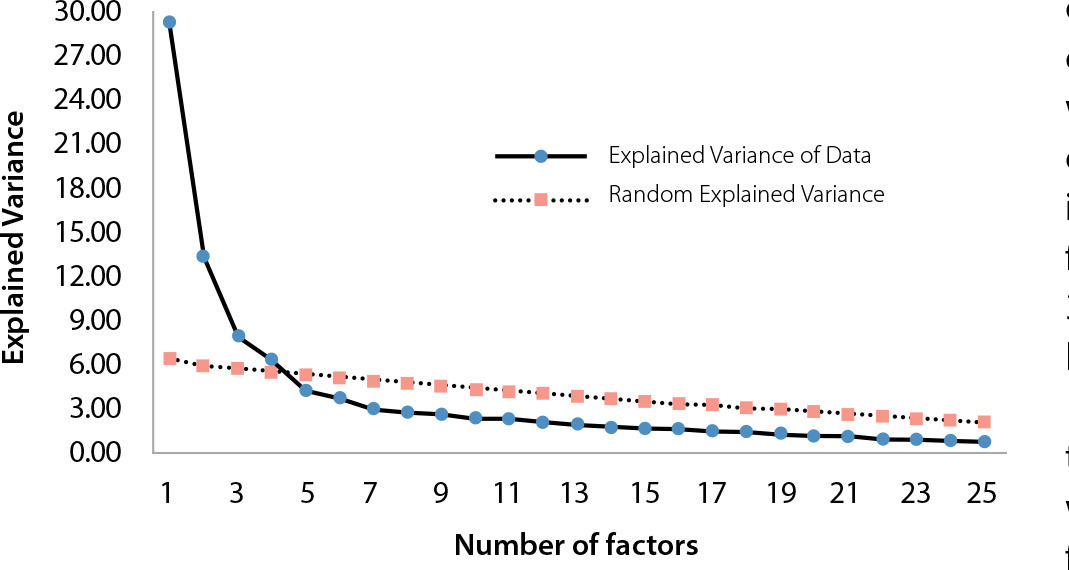
-
ORIGINAL ARTICLE07-29-2024
Nurses’ perspectives on nurses’ work methods
Revista Brasileira de Enfermagem. 2024;77(3):e20230374
Abstract
ORIGINAL ARTICLENurses’ perspectives on nurses’ work methods
Revista Brasileira de Enfermagem. 2024;77(3):e20230374
DOI 10.1590/0034-7167-2023-0374
Views0See moreABSTRACT
Objectives:
To analyze nurses’ perspectives on nurses’ work methods in the hospital context.
Methods:
A descriptive study with a qualitative approach was conducted in a hospital in northern Portugal, involving 17 nurses. Semi-structured interviews were used for data collection. Data collected between May and June 2023 underwent content analysis, supported by Atlas.ti software.
Results:
Three thematic areas emerged: “Nurses’ work methods in a hospital context,” highlighting the conception and components of work methods and the methods in use; “Implementation of nurses’ work methods,” emphasizing influencing factors and challenges to implementation; and “Impact of nurses’ work methods on patients, nurses, and institutions.”
Final Considerations:
Nurses’ work methods constitute the structure of nursing care. Some factors influence and some challenges arise in the implementation of these methods, producing impacts on patients, nurses, and institutions.

-
ORIGINAL ARTICLE07-29-2024
Nursing Process for institutionalized older adults: contributions from knowledge awareness workshop
Revista Brasileira de Enfermagem. 2024;77(3):e20230349
Abstract
ORIGINAL ARTICLENursing Process for institutionalized older adults: contributions from knowledge awareness workshop
Revista Brasileira de Enfermagem. 2024;77(3):e20230349
DOI 10.1590/0034-7167-2023-0349
Views0See moreABSTRACT
Objective:
To analyze the knowledge of professionals working in a Nursing Home about the Nursing Process before and after the awareness workshop.
Methods:
This is strategic action research, developed with nursing professionals and managers of a Nursing Home in Rio Grande do Sul, Brazil. Data were collected between January and June 2023, through semi-structured interviews before and after an awareness workshop. Discursive textual analysis of the data was carried out.
Results:
The central category “Understanding about the Nursing Process in Nursing Homes” emerged, which was unitized into two units of meaning and three categories of analysis.
Conclusion:
Data revealed non-use and lack of knowledge of the Nursing Process before awareness raising. Afterwards, a deeper understanding of the topic and its importance was identified. Awareness-raising workshops contribute to transformation of knowledge.
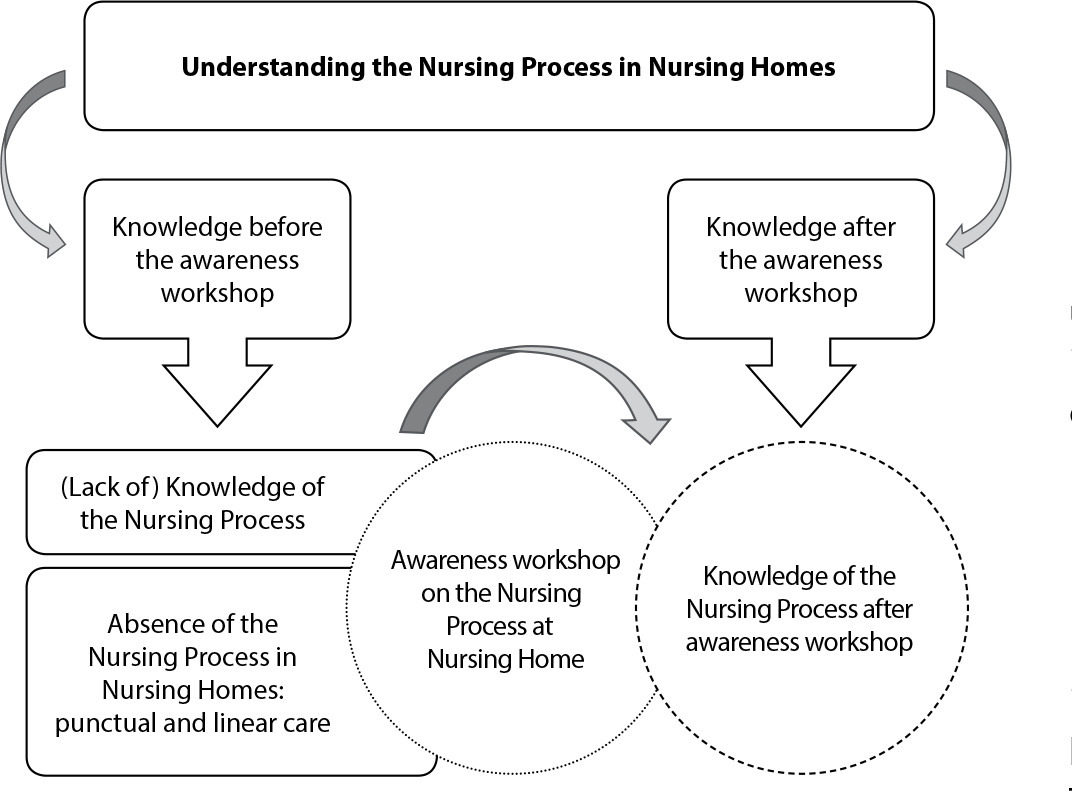
-
ORIGINAL ARTICLE07-29-2024
Excessive daytime sleepiness in nursing technicians: association with sleep quality and memory
Revista Brasileira de Enfermagem. 2024;77(3):e20230332
Abstract
ORIGINAL ARTICLEExcessive daytime sleepiness in nursing technicians: association with sleep quality and memory
Revista Brasileira de Enfermagem. 2024;77(3):e20230332
DOI 10.1590/0034-7167-2023-0332
Views0See moreABSTRACT
Objective:
to investigate excessive daytime sleepiness prevalence among nursing technicians and the association with sleep quality and memory.
Methods:
a cross-sectional, inferential study, carried out in a hospital unit in the state of Goiás between December 2020 and January 2021. Assessments were carried out using the Epworth Sleepiness Scale, the Pittsburgh Sleep Quality Index and the Prospective and Retrospective Memory Questionnaire, instruments validated for the Brazilian context. Bivariate and multivariate logistic regression analyzes were performed.
Results:
the sample consisted of 189 nursing technicians with a 40.9% excessive daytime sleepiness prevalence. In multivariate models, excessive daytime sleepiness was not associated with sleep quality, however there was a significant association with overall memory failures.
Conclusions:
study results demonstrate a high excessive daytime sleepiness occurrence, an association with overall memory failures and the need for psychosocial interventions for nursing technicians.
-
ORIGINAL ARTICLE07-29-2024
Educational technology for multidisciplinary training for managing waiting lists for elective patients
Revista Brasileira de Enfermagem. 2024;77(3):e20230299
Abstract
ORIGINAL ARTICLEEducational technology for multidisciplinary training for managing waiting lists for elective patients
Revista Brasileira de Enfermagem. 2024;77(3):e20230299
DOI 10.1590/0034-7167-2023-0299
Views1See moreABSTRACT
Objectives:
to construct and assess an educational technology for managing patient waiting lists for multidisciplinary training.
Methods:
study supported by Instructional Design – ADDIE model, whose stages of construction of educational technology were developed in the form of a multi-professional training course. Its respective content assessment was carried out by a committee of experts from 2021 to 2022. The analysis occurred based on the proportion of content adequacy with 95% Confidence Interval.
Results:
seventeen products were created as educational technology learning objects: five storyboards; four videos; three comic books; two pedagogical action plans; a mind map; and a YouTube® playlist. Nine experts assessed content adequacy, which reached 0.89.
Conclusions:
this educational technology contributes to the performance of professionals who manage waiting lists by reducing inequalities, alleviating differences, in addition to promoting equity in care and good health for patients in the Brazilian Health System.

-
ORIGINAL ARTICLE07-29-2024
Fuzzy Logic: vulnerability of women who have sex with women to sexually transmitted infections
Revista Brasileira de Enfermagem. 2024;77(3):e20230271
Abstract
ORIGINAL ARTICLEFuzzy Logic: vulnerability of women who have sex with women to sexually transmitted infections
Revista Brasileira de Enfermagem. 2024;77(3):e20230271
DOI 10.1590/0034-7167-2023-0271
Views0See moreABSTRACT
Objective:
To describe the possibility of applying Fuzzy Logic in analyzing the vulnerability of Women Who Have Sex with Women to Sexually Transmitted Infections/HIV/AIDS.
Methods:
We developed a Fuzzy Logic system with 17 input variables and one output variable, using data related to vulnerability in a municipality located in the Midwest region of the State of São Paulo, Brazil.
Results:
The factor with the greatest positive impact was the confirmation that a low understanding of Sexually Transmitted Infections/HIV/AIDS is associated with higher vulnerability. Conversely, the statement “Not disclosing sexual activity to healthcare professionals,” where individuals do not admit to having sex with women, had the least impact.
Conclusions:
Fuzzy Logic facilitates the identification of vulnerability, expressed through the analysis of interaction between variables in each dimension. This makes it a promising method to assist in analyzing the vulnerability of specific populations.
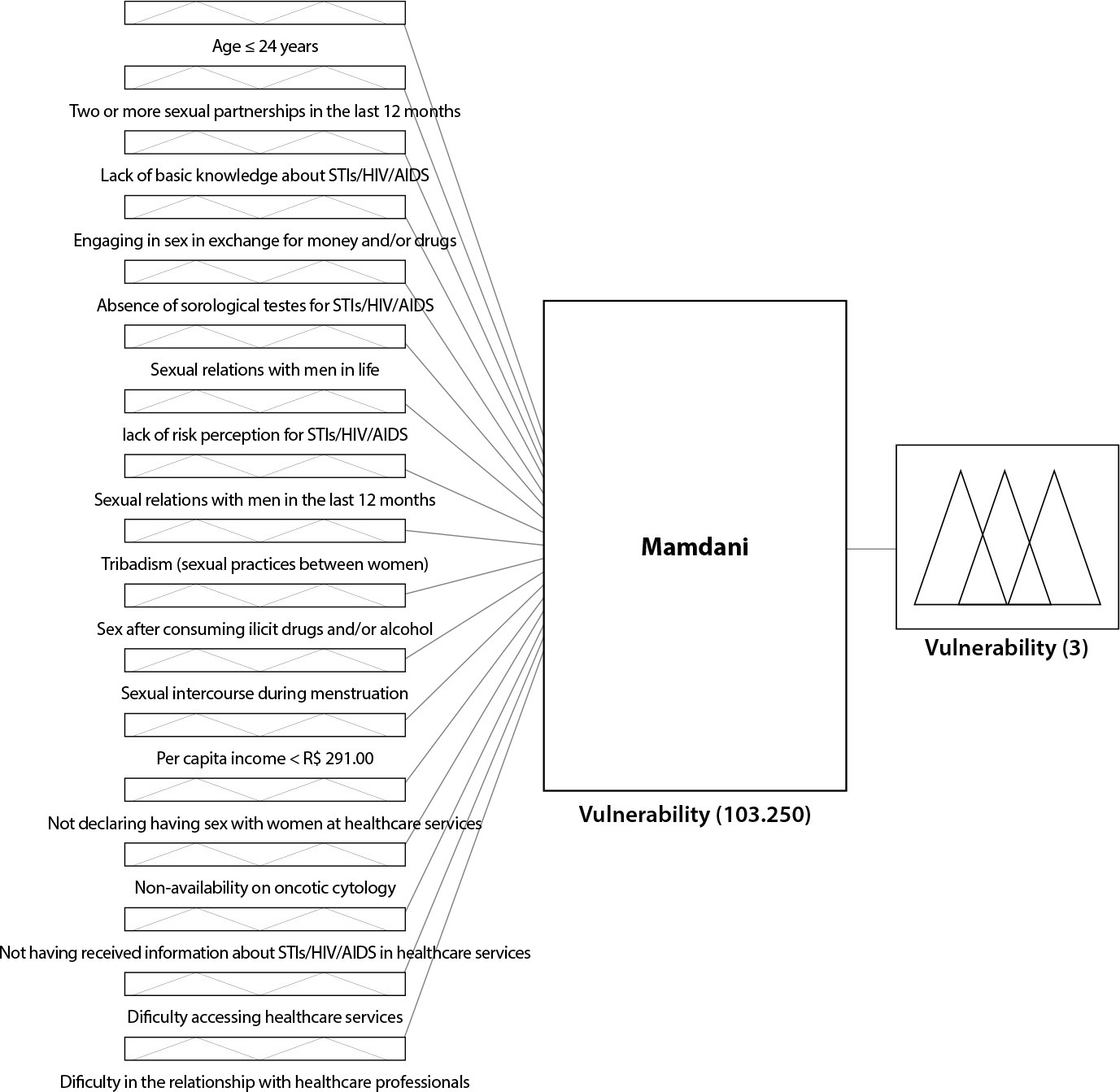
-
ORIGINAL ARTICLE07-29-2024
University Student Depression Inventory, Brazilian Version, Construct Assessment
Revista Brasileira de Enfermagem. 2024;77(3):e20230232
Abstract
ORIGINAL ARTICLEUniversity Student Depression Inventory, Brazilian Version, Construct Assessment
Revista Brasileira de Enfermagem. 2024;77(3):e20230232
DOI 10.1590/0034-7167-2023-0232
Views0See moreABSTRACT
Objectives:
to assess the University Student Depression Inventory, Brazilian version (USDI-BR), construct.
Methods:
a methodological study carried out with a snowball probabilistic sample, consisting of 334 undergraduate and graduate students. Confirmatory factor analysis, reliability using McDonald’s omega coefficient and Cronbach’s alpha were performed. Principal component analysis was performed using the varimax rotation and oblimin rotation, using the Kaiser-Meyer-Olkin criteria, Bartlett’s test of sphericity and scree plot.
Results:
the USDI-BR presented an internal consistency of items of ω = 0.95 and remained with 30 items, with the addition of 1 factor (Death wish and social withdrawal), totaling 4 factors.
Conclusions:
the USDI-BR has evidence that points to its validity and also its internal consistency, deserving that new studies be carried out to expand the evidence of its psychometric properties.
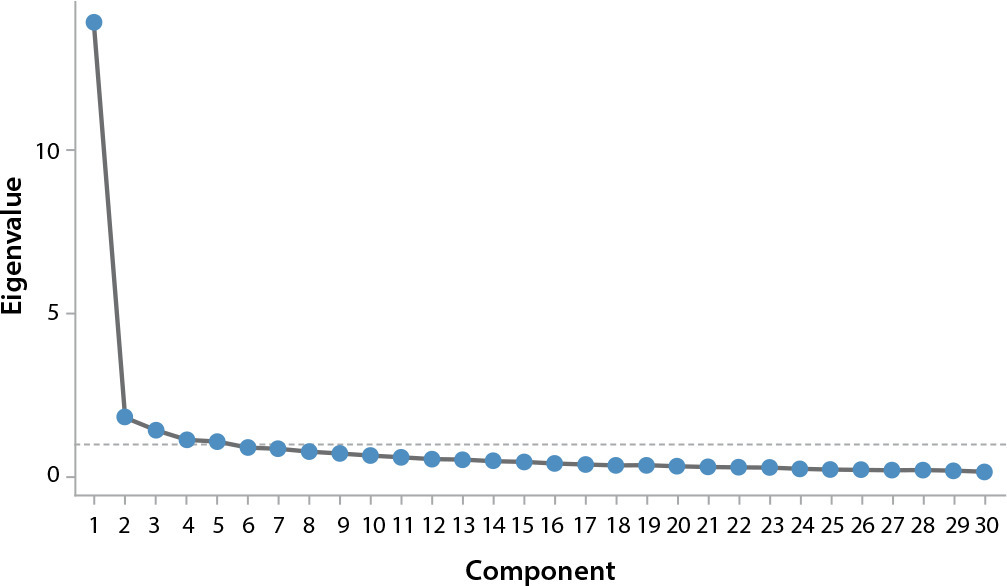
-
ORIGINAL ARTICLE07-29-2024
Family refusal of skin donation for transplantation: trends and associated factors
Revista Brasileira de Enfermagem. 2024;77(3):e20230209
Abstract
ORIGINAL ARTICLEFamily refusal of skin donation for transplantation: trends and associated factors
Revista Brasileira de Enfermagem. 2024;77(3):e20230209
DOI 10.1590/0034-7167-2023-0209
Views0See moreABSTRACT
Objectives:
to analyze the trends and factors associated with family refusal of skin donation for transplantation.
Methods:
this cross-sectional study was conducted in the State of São Paulo, with family authorization terms collected from 2001 to 2020. The variables analyzed included year, age, gender, cause of death, and type of institution. Data were analyzed using linear and multiple logistic regression, with the Odds Ratio estimated at p<0.05 for statistical significance.
Results:
1,355 individuals refused skin donation. The trend of refusals decreased between 2001 and 2009 in the age groups of 0-11 years and 12-19 years, but increased in the group aged ≥60 years. This trend continued to decrease in the 0-11 years group from 2010 to 2020, and increased in the 20-40 years group. Males and the age groups of 20-40 years, 41-59 years, and ≥60 years exhibited 27%, 34%, 47%, and 53% lower chances of refusal, respectively.
Conclusions:
there is an urgent need for measures to mitigate the high number of refusals associated with skin donation.
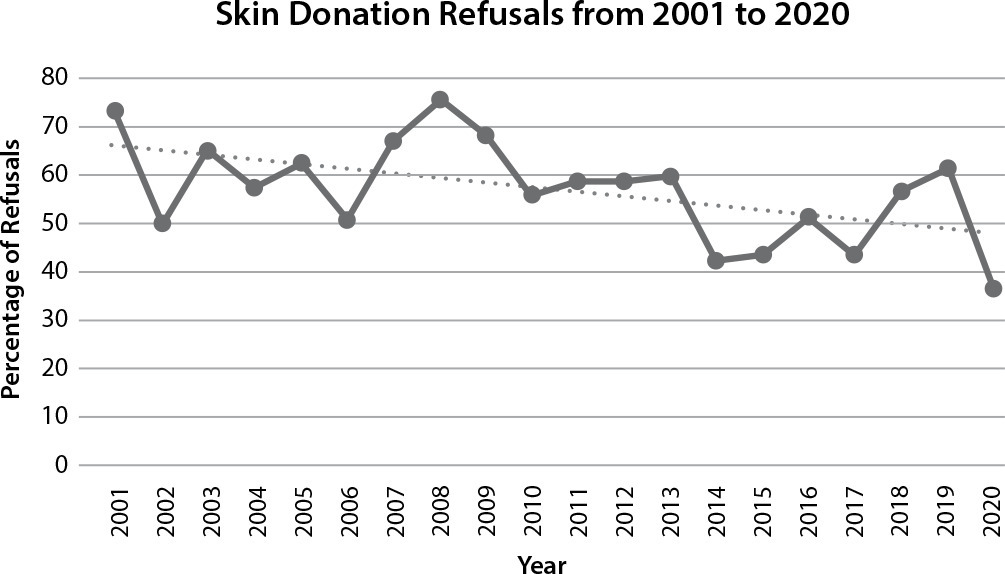
Search
Search in:
Nuvem de Tags
Adolescente (85) Atenção Primária à Saúde (239) COVID-19 (91) Criança (91) Cuidados de Enfermagem (269) Educação em Enfermagem (151) Educação em Saúde (139) Enfermagem (930) Enfermagem Pediátrica (86) Estudantes de Enfermagem (77) Estudos de Validação (131) Família (87) Idoso (208) Promoção da Saúde (99) Qualidade de Vida (104) Saúde do Trabalhador (86) Saúde Mental (145) Saúde Pública (82) Segurança do Paciente (150) Tecnologia Educacional (100)



